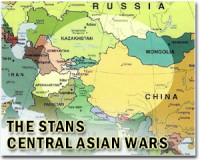| . |  |
. |
Washington (AFP) Oct 22, 2010 The United States has made a new bid to improve its uneasy war partnership with Pakistan by offering a two-billion-dollar arms package but warned it will not tolerate human rights abuses. The five-year assistance plan satisfies a key request of Pakistan's influential military, which assists the US military in Afghanistan and was initially uneasy about a US shift to civilian assistance. Secretary of State Hillary Clinton said Friday that the US administration would ask Congress to approve two billion dollars in military aid from 2012 to 2016, replacing an earlier five-year package that expired. "The United States has no stronger partner when it comes to counterterrorism efforts against the extremists who threaten us both than Pakistan," Clinton said at three-day talks between the two nations. But the United States also said that, complying with US law, it has decided to bar assistance to units accused of abuses. A video surfaced this month that appears to show Pakistani troops summarily executing six men. "We take all allegations of human rights abuses seriously, and we discuss them with the government of Pakistan," Clinton said. US officials declined to list the names of units to be blacklisted, but said there were several. Pakistani Foreign Minister Shah Mehmood Qureshi promised that Pakistan was investigating the video but was not yet sure of its authenticity. "I can assure you that there will be zero tolerance against human rights violations," Qureshi said. The military package would be in addition to 7.5 billion dollars Congress committed over five years in civilian aid, including building schools and roads, and millions of dollars more in relief for Pakistan's floods. The latest military package does not include so-called Coalition Support Funds, in which the United States financially compensates Pakistan for military actions. A US government report in June 2008 estimated that the United States at that point had given nearly 11 billion dollars in total aid to Pakistan since the September 11, 2001 attacks, mostly to the military. Pakistan, which had been the main backer of Afghanistan's Taliban regime, dumped its support overnight after September 11 and became the pivotal US partner offering access into its northwestern neighbor. US officials have long questioned whether Pakistan has fully cut off ties to Afghanistan's Taliban or acted against extremists at home. But Pakistan last year launched a major offensive on homegrown Taliban, who moved perilously close to the nuclear power's capital Islamabad. "There are still tongue-in-cheek comments, even in this capital, about Pakistan's heart not really being in this fight. I do not know what greater evidence to offer than the blood of our people," Qureshi said. "Prophets of doom are back in business painting doomsday scenarios about our alliance. They are dead wrong," he said. But a White House report to Congress this month faulted Pakistan for not working against Afghanistan's Taliban, in what experts say is an attempt by Islamabad to preserve influence in its neighbor if and when US troops leave. The United States and India have also said that Pakistan should do more to rein in fervently anti-Indian groups such as Lashkar-e-Taiba, which is blamed for orchestrating the bloody 2008 siege of Mumbai. Obama plans to pay his first presidential visit to India next month in an effort to show his personal commitment to broadening the relationship between the world's two largest democracies. Indian commentators have worried about Obama's early focus on Pakistan and China -- concerns unlikely to be allayed by the military package. India has begrudgingly accepted the need for civilian aid to Pakistan but in the past voiced fears that any military assistance would be used against India, not extremists. Pakistan and India have fought three full-fledged wars, two of them over Kashmir, the divided Himalayan region which recently witnessed protests over Indian rule. Qureshi urged Obama to raise Kashmir during his presidential visit, referring to his comments in 2008 before his inauguration in which he mused about US mediation, triggering a backlash in India. "His coming visit to the region is the time to begin to redeem the pledge that he made earlier," Qureshi said. Asked about his remarks, State Department spokesman Philip Crowley said that the United States had "great concern" over Kashmir but did not see itself as a direct mediator.
Share This Article With Planet Earth
Related Links News From Across The Stans
 Azerbaijan doubles defence spending
Azerbaijan doubles defence spendingBaku (AFP) Oct 22, 2010 Lawmakers in Azerbaijan on Friday approved a state budget for next year that nearly doubles defence spending and forecasts continued economic growth for the energy-rich former Soviet republic. The boost in defence spending, after Azerbaijan already more than doubled military expenditures in the last two years, comes amid rising tensions in the country's conflict with Armenia over the breakaw ... read more |
|
| The content herein, unless otherwise known to be public domain, are Copyright 1995-2010 - SpaceDaily. AFP and UPI Wire Stories are copyright Agence France-Presse and United Press International. ESA Portal Reports are copyright European Space Agency. All NASA sourced material is public domain. Additional copyrights may apply in whole or part to other bona fide parties. Advertising does not imply endorsement,agreement or approval of any opinions, statements or information provided by SpaceDaily on any Web page published or hosted by SpaceDaily. Privacy Statement |